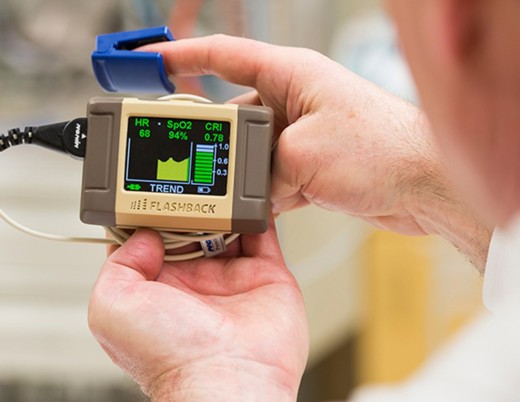Key takeaways
-
Children’s Hospital Colorado researchers retrospectively reviewed charts of adolescents with severe obesity undergoing evaluation for metabolic bariatric surgery (MBS) to identify occurrence of obstructive sleep apnea (OSA) before and after surgery.
-
OSA in adolescents undergoing MBS is more prevalent than the general adolescent population with severe obesity.
-
Patients with unchanged OSA had significantly higher BMI and weight prior to surgery.
Research background: OSA in those with severe obesity and their response to MBS
- 54% of adolescents with severe obesity in study had obstructive sleep apnea (OSA) before metabolic bariatric surgery (MBS)
- 43% of these patients had severe OSA
- About 2/3 of study patients who had sleep study after MBS had OSA remission
Obstructive sleep apnea can occur in individuals with obesity, and its severity increases with their body mass index. The condition can lead to increased risk for cardiovascular and metabolic disease and death.
Metabolic bariatric surgery (MBS) can improve OSA in some adults with severe obesity, but 50% may still have OSA even after losing significant weight. Little is known about what factors contribute to the health outcomes of adolescents with severe obesity after MBS, including remission of OSA.
Researchers in the Bariatric Surgery Center at Children’s Hospital Colorado sought to (1) identify the occurrence of OSA in patients with severe obesity before and after MBS, and (2) examine factors that were associated with remission of OSA in this patient population.
Research methods: examining OSA severity in adolescents with severe obesity before and after MBS
Researchers retrospectively reviewed the charts of 81 adolescent and young adults before MBS with OSA assessments completed between June 2017 and September 2020 at Children’s Colorado. BMI data was collected before the surgery and at two weeks, four to six weeks, and three, six, nine and 12 months after surgery.
In addition to other pre-surgical evaluations, Children’s Colorado requires a sleep evaluation and sleep studies for any patient with known OSA. Polysomnography (PSG) variables were applied to adult Obstructive Apnea–Hypopnea Index (OAHI) severity scores before and after surgery to establish a baseline for the study.

Researchers then compared baseline data and surgical outcomes to the patient’s OSA before MBS. This was stratified by remission versus no remission after surgery.
Study results: identifying the prevalence of OSA in patients after MBS
All patients underwent a sleeve gastrectomy surgical procedure.


OSA post-surgery:

Predicting likelihood of OSA remission after MBS surgery
Researchers examined differences in study sample of patients whose OSA resolved with those who continued to have OSA. They found:
- Patients with resolved OSA had significantly lower OAHI scores before and after MBS
- Patients with unchanged OSA had significantly higher BMI and weight on surgery date
Research discussion: post-bariatric surgery OSA remission
Study authors found the occurrence of OSA in the study sample was similar to prior studies in adults but higher than previous studies of adolescents. They also found no association between changes in OSA and baseline obesity-associated co-morbidities.
What’s not clear are which factors are the strongest predictors of OSA remission after bariatric surgery. In particular, tonsil size was not significantly different for those with and without post-surgery OSA, so it may not be a relevant risk factor.
Research conclusion: OSA more prevalent in patients undergoing MBS
In this study, OSA occurred more frequently in the adolescent MBS population than the general adolescent population with severe obesity. Remission of OSA was linked to lower pre-MBS BMI and weight, but not weight loss within the first year post-MBS.
Study authors recommend pre- and post-MBS sleep studies to identify patients with OSA. They also recommend more research to determine factors for OSA remission in this population, as well as further study into interventions to improve positive airway pressure treatment adherence for those who do not experience OSA remission after MBS.
Featured Researchers

Stephen Hawkins, MD
Pediatric sleep specialist
The Breathing Institute
Children's Hospital Colorado
Associate professor
Pediatrics-Pulmonary Medicine
University of Colorado School of Medicine

Jill Kaar, PhD
Pediatric endocrinology
Children's Hospital Colorado
Associate professor
Pediatrics-Endocrinology
University of Colorado School of Medicine

Stacey Simon, PhD
Pediatric sleep psychologist
The Breathing Institute
Children's Hospital Colorado
Associate professor
Pediatrics-Pulmonary Medicine
University of Colorado School of Medicine





 720-777-0123
720-777-0123










